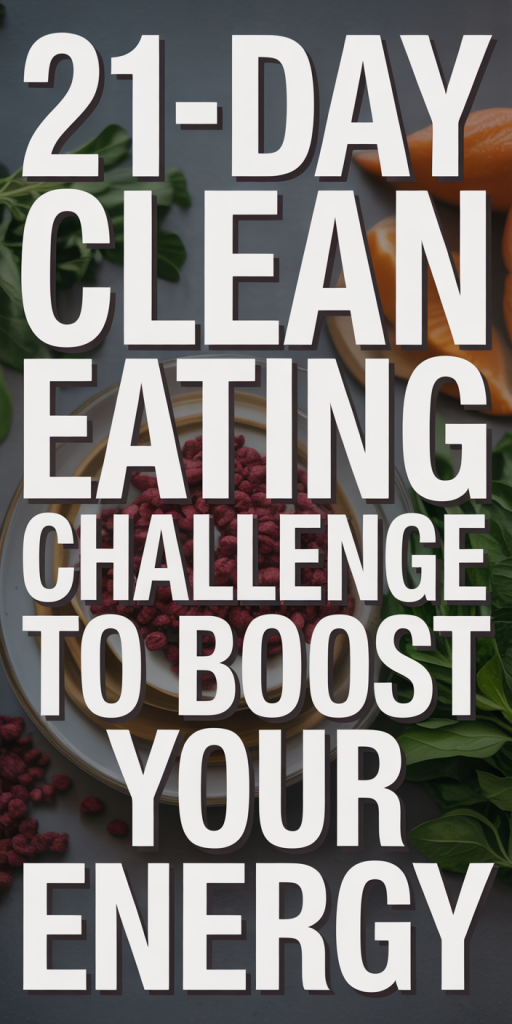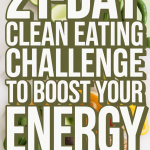Transform Your Energy: Join the 21-Day Clean Eating Challenge for a Healthier You
Feeling drained and sluggish? You’re not alone. Many of us struggle with low energy levels, often fueled by our busy lives and unhealthy eating habits. That’s why I decided to embark on a 21-day clean eating challenge, and let me tell you, it was a game changer.
This challenge isn’t just about eating fruits and veggies; it’s about nourishing your body with whole foods that provide the energy boost we all crave. Over the next few weeks, I’ll share my journey, tips, and recipes that helped me feel revitalized and ready to tackle each day. Join me as we explore how clean eating can transform our energy levels and overall well-being.
Overview of the 21-Day Clean Eating Challenge
The 21-Day Clean Eating Challenge focuses on eliminating processed foods and incorporating whole, nutrient-dense options. This commitment to clean eating requires strict adherence to meal planning and preparation. Each day emphasizes fruits, vegetables, whole grains, healthy fats, and lean proteins.
During the challenge, I tracked my meals, ensuring they contained essential vitamins and minerals. This approach aimed at providing sustained energy levels throughout the day. I prepared diverse recipes, exploring new combinations of ingredients that aligned with the clean eating principles.
The challenge not only aimed to enhance energy but also sought to promote a healthier relationship with food. By avoiding sugar, refined grains, and unhealthy fats, I noticed a significant improvement in my energy and overall mood. Staying hydrated played a crucial role, as well, with a focus on drinking plenty of water and herbal teas.
I dedicated time daily to reflect on my progress, assessing energy levels, cravings, and mood swings. This self-evaluation helped adjust my eating habits further and provided insight into my body’s responses. Each week, I introduced new challenges, like increasing vegetable intake or experimenting with meal prep techniques.
The commitment to this clean eating journey fosters a more mindful approach to nutrition. Engaging fully in the process made it easier to identify desired outcomes, such as increased vitality and improved digestion. Each day of the challenge contributes to a cumulative effect, enhancing my overall sense of well-being.
Benefits of Clean Eating for Energy
Clean eating significantly boosts energy levels through improved nutrition and digestion.
Improved Nutrient Intake
Clean eating enhances nutrient intake by focusing on whole foods, which provide essential vitamins and minerals. Nutrient-dense options, like leafy greens and lean proteins, fuel the body effectively. Increased consumption of complex carbohydrates, such as whole grains and legumes, stabilizes blood sugar, preventing energy crashes. Regularly eating high-fiber fruits and vegetables aids in replenishing vitamins and antioxidants, further elevating energy levels. Maintaining a balanced diet through clean eating helps ensure consistent energy throughout the day.
Enhanced Digestion
Clean eating promotes better digestion by incorporating fiber-rich foods that support gut health. Improved digestion allows for optimal nutrient absorption, which directly impacts energy levels. Whole foods such as vegetables, fruits, and whole grains help maintain a healthy digestive system by preventing bloating and discomfort. Staying hydrated with water and herbal teas aids in digestion, flushes out toxins, and boosts energy. An improved gut environment from clean eating also supports a robust immune system, further enhancing overall vitality.
Preparing for the Challenge
Preparation is key for success in the 21-day clean eating challenge. I focused on key strategies to ensure an effective transition to clean eating.
Setting Realistic Goals
I set achievable goals for the challenge. Instead of aiming for perfection, I concentrated on gradual improvements. Balancing my personal lifestyle and food preferences made the journey more sustainable. Benchmarks included reducing processed food intake each week and incorporating a wider variety of whole foods in my meals. Tracking my progress kept me motivated and accountable.
Creating a Meal Plan
I developed a detailed meal plan before starting the challenge. The plan focused on nutrient-dense foods while minimizing processed options. Each week, I included a mix of fruits, vegetables, whole grains, healthy fats, and lean proteins. I dedicated time to explore new recipes, ensuring meals remained exciting and varied. Preparing a shopping list based on my meal plan minimized impulse purchases, making it easier to stick to clean eating principles.

Foods to Include in Your Clean Eating Plan
Incorporating the right foods into my clean eating plan dramatically improved my energy levels. Focusing on whole foods and staying hydrated became essential components of my journey.
Whole Foods
Whole foods form the backbone of my clean eating challenge. I prioritized:
- Fruits: Fresh fruits like blueberries, bananas, and apples provide essential vitamins, antioxidants, and natural sugars for quick energy boosts.
- Vegetables: Leafy greens such as spinach, kale, and broccoli enhance nutrient intake and support digestion with their fiber content.
- Whole Grains: Options like quinoa, brown rice, and oats offer complex carbohydrates that stabilize blood sugar and provide sustained energy.
- Healthy Fats: Sources like avocados, nuts, and seeds deliver necessary fatty acids, promoting brain health and contributing to feeling satisfied.
- Lean Proteins: Foods such as chicken, fish, and legumes support muscle repair and energy levels, preventing fatigue after workouts.
By focusing on these whole foods, I noticed a significant increase in my vitality and overall well-being.
Hydration
Hydration plays a crucial role in my clean eating strategy. I ensured to consume:
- Water: Drinking at least 64 ounces daily kept my body hydrated and supported all bodily functions, including digestion and energy levels.
- Herbal Teas: Incorporating teas like green tea and peppermint provided hydration, antioxidants, and additional health benefits without added sugars.
- Infused Water: Adding fruits like lemon, cucumber, or berries to water not only enhanced the flavor but also encouraged me to drink more fluids throughout the day.
Maintaining proper hydration helped me feel more energetic and focused, reinforcing the positive effects of my clean eating journey.
Tips for Staying on Track
Staying on track during the 21-day clean eating challenge requires planning and commitment. I found that implementing effective strategies made a significant difference in my journey.
Meal Prep Strategies
Meal prep plays a crucial role in maintaining clean eating habits. I dedicated a few hours each week to prepare meals in advance. This strategy included:
- Batch cooking: Cooking large quantities of whole grains, such as quinoa or brown rice, saved time and ensured I had easy-to-reheat options.
- Pre-chopping vegetables: Chopping veggies like carrots, bell peppers, and cucumbers ahead of time made it easy to grab healthy snacks or add them to meals.
- Portable snacks: Preparing healthy snacks, such as mixed nuts or energy balls, kept me satisfied between meals and reduced the temptation to reach for processed options.
- Freezing meals: Storing complete meals in portioned containers allowed for quick access during busy days.
Finding Support
- Joining online communities: Participating in forums and social media groups focused on clean eating fostered a sense of belonging and provided motivation.
- Sharing my journey: Documenting my progress on social media allowed me to connect with like-minded individuals and celebrate small victories.
- Involving friends in meal prep: Hosting meal prep sessions with friends created a fun environment and made the process more enjoyable, reinforcing our commitment to clean eating.
Conclusion
Taking on the 21-day clean eating challenge has truly transformed my energy levels and overall well-being. By prioritizing whole foods and eliminating processed options I’ve noticed a significant boost in my mood and vitality. This journey taught me the importance of mindful eating and meal preparation.
I encourage you to consider trying this challenge for yourself. Embrace the process of nourishing your body with nutrient-dense foods and see how it impacts your energy levels. Remember to stay flexible and have fun with it. With dedication and creativity you can unlock a new level of energy that enhances your daily life.






